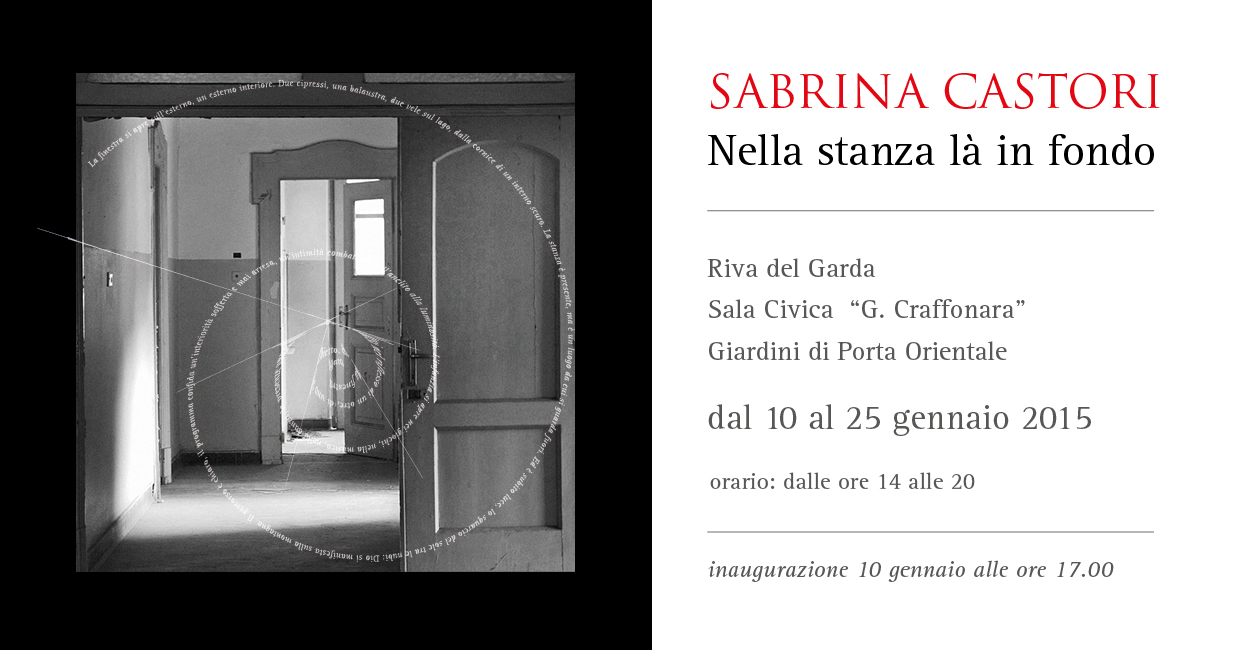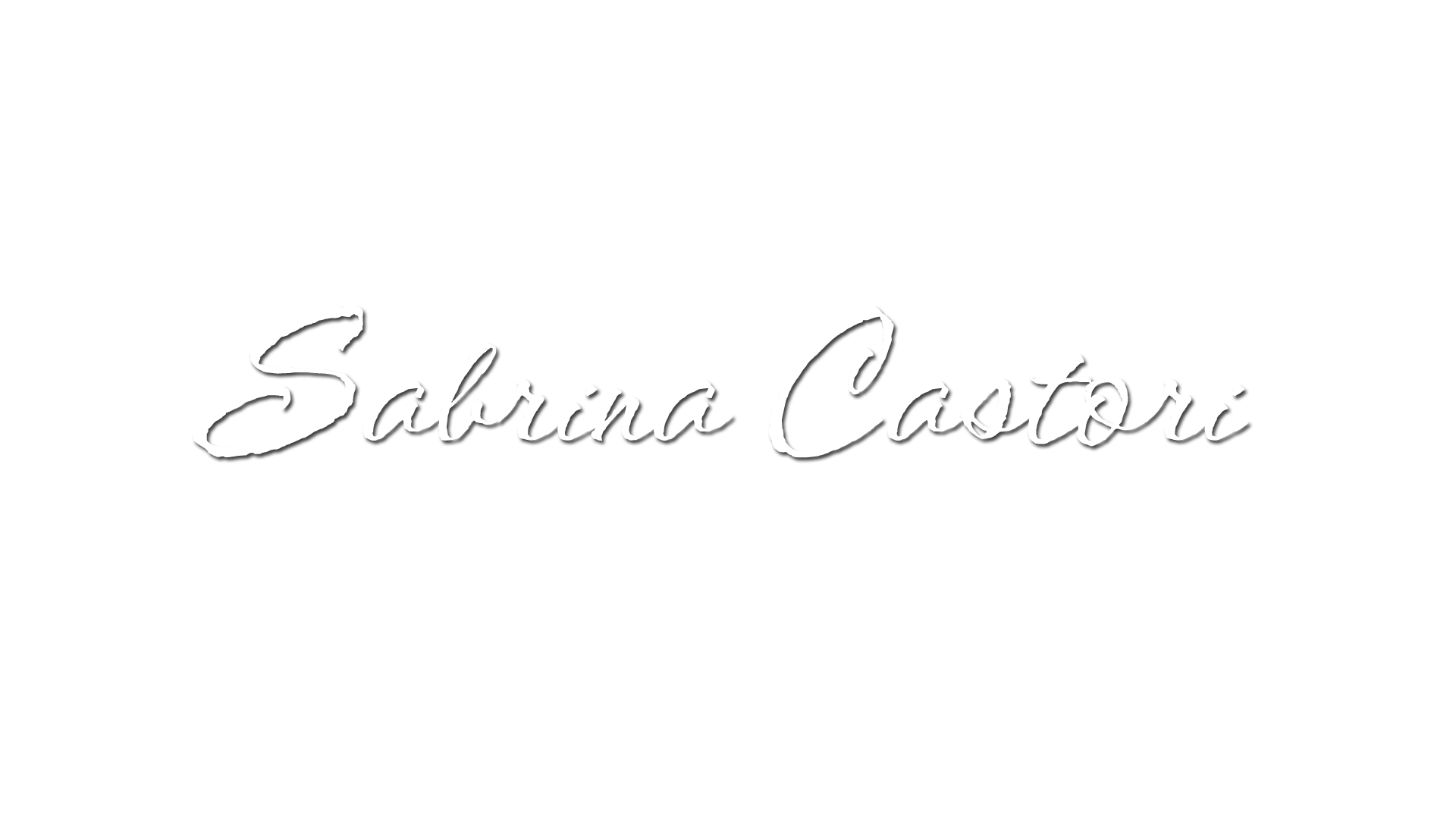
Mostra Riva del Garda sala civica “G.Craffonara”
NELLA STANZA LÀ IN FONDO
La finestra si apre sull’esterno, un esterno interiore.
Due cipressi, una balaustra, due vele sul lago, dalla cornice di un interno scuro.
La stanza è presente, ma è un luogo da cui si guarda fuori.
Ed è subito luce, lo squarcio del sole tra le nubi: Dio si manifesta sulla montagna.
Il percorso è chiaro, il programma confida un’interiorità sofferta e mai arresa, un’intimità combattuta nell’anelito alla luminosità.
L’infanzia si apre nei giochi, nella musica, nella danza, le presenze umane prendono a rarefarsi nel riflesso di un otre, di uno specchietto, di una finestra rigata dalla pioggia.
Il rituale religioso spazza le foglie in fondo alla scala, i ciottoli conducono all’ombra della croce stagliata sulla redenzione. Il tempo stende la sua ragnatela tra le rovine, le presenze vanno, salgono, costeggiano gli scogli.
Sempre di spalle, o col viso nascosto da un albero: perché il passato sta dietro, non ritorna, continua a sospingere avanti.
Rimangono tracce di apparizioni, ectoplasmi ondeggianti su una porta, lungo un vialetto, presenze instabili, porte che si aprono su altre porte illuminate da finestre laterali. Le nubi ci sono ancora, e insieme a esse, la luce, che insiste a mostrarsi attraverso l’ombra, senza la quale non risalterebbe.
Infine l’esterno è completamente aperto, ma l’oscurità lotta ancora per rendere più efficace l’inarrestabile spinta del sole.
Nella stanza là in fondo non c’è più stanza. Solo cielo e il ricordo di un conflitto perpetuo.
THERE AT THE ROOM’S END
The window opens to the outside, an inner outside.
Two cypresses, a balustrade, two sails on the lake, framed by a dark inside.
The room is there, but it is only the place to look outside.
And suddenly there is light, a sunbeam among the clouds: God revealing himself on the mountain
The way is clear, the program trusts in a suffered inwardness never giving up, an intimate fighting yearning for the brightness.
The childhood reveals itself in the games, the music, the dance, in the human presence that begin to fade in the reflection of a drunkard, a small mirror, a window striped by the rain.
The religious ceremony sweeps the leaves away at the end of the stairway, the pebbles lead to the cross’ shadow standing out on redemption. Time spreads its web on the ruins, the presences go, rise, follow the reefs. Always from the back, or with the face hidden by a tree: because the past is behind, is not coming back and always pushing forwards.
There remain apparitions’ traces, ectoplasms waving on a door, along a path, instable presences, doors opening on other doors lit up by side windows. Clouds are always there and together with them the light insisting on showing itself through the darkness, which is still fighting to emphasize the increasing power of the sun more effectively.
At the end, the outside is completely open, but the darkness is still fighting for express more effective the unceasing sun’s push.
There behind in the room there is no other room: only heaven and the memory of an eternal fight.
DA HINTEM IM ZIMMER
Das Fenster öffnet sich nach Außen, einem innerem Außen.
Zwei Zypressen, ein Geländer, zwei Segel auf dem See, umrahmt von einem dunklen Inneren.
Das Zimmer ist hier, ist aber ein Ort, aus dem man nach Außen schaut.
Und sofort erscheint das Licht, ein Sonnenstrahl zwischen den Wolken: Gott zeigt sich am Berg.
Der Weg ist klar und deutlich, das Programm vertraut eine leidende, aber nie aufgegebene Innerlichkeit an, eine geplagte Intimität im Streben nach der Helligkeit.
Die Kindheit eröffnet sich in den Spielen, in der Musik, im Tanz, die menschliche Präsenz beginnt seltener zu werden in der Spiegelung des Trinkers, eines Spiegels, eines vom Regen gestreiften Fensters.
Das religiöse Ritual verweht die Blätter am Ende der Treppe, die Kieselsteine führen zum Schatten des Kreuzes, das sich von der Erlösung abzeichnet. Die Zeit breitet ihr Spinnennetz zwischen den Ruinen aus, die Anwesenheiten gehen, steigen, folgen den Felsen.
Immer von hinten, oder mit dem Gesicht von einem Baum versteckt, weil die Vergangenheit hinten bleibt, nicht mehr zurück kommt, immer vorwärts treibt.
Es bleiben die Spuren von Erscheinungen, auf einer Tür wogen Ektoplasmas, instabile Anwesenheiten eine Gasse entlang, Türen die sich auf andere von Fenstern erleuchtete Türen öffnen. Die Wolken sind immer noch da, und mit denen das Licht, dass darauf besteht, sich durch den Schatten zu zeigen, weil es ohne diesen Schatten nicht auffallen würde.
Zum Schluss ist das Äußere weit geöffnet, die Dunkelheit kämpft immer noch um den unaufhaltsamen Drang der Sonne wirksamer zu machen.
Da hinten im Zimmer befindet sich kein Zimmer mehr. Nur der Himmel und die Erinnerung an einen endlosen Kampfes.
 Sabrina Castori
Sabrina Castori 